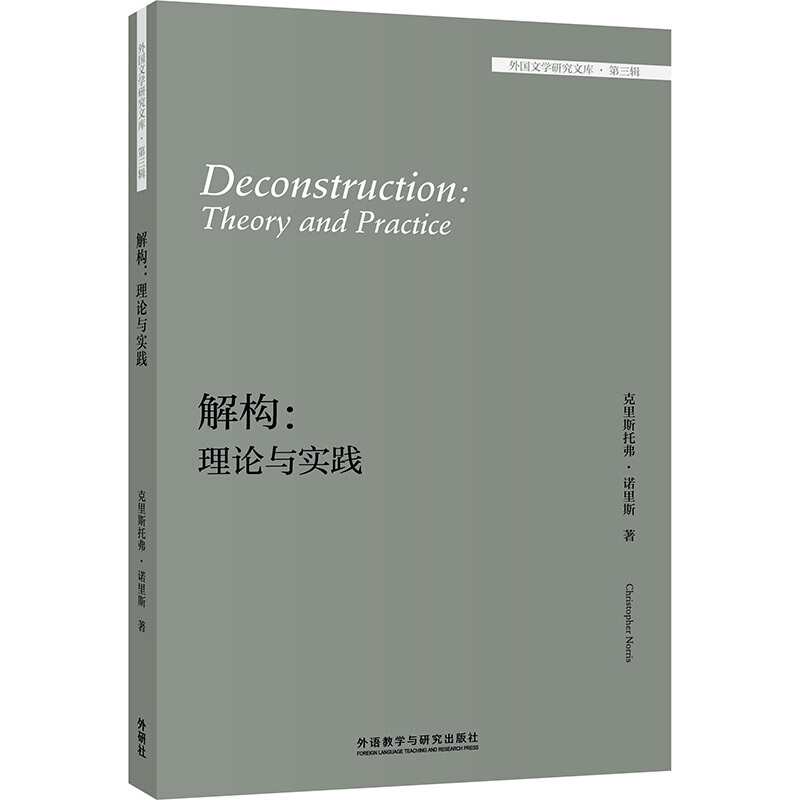
包邮外国文学研究文库解构:理论与实践/外国文学研究文库第3辑

- ISBN:9787521320558
- 装帧:一般胶版纸
- 册数:暂无
- 重量:暂无
- 开本:其他
- 页数:272
- 出版时间:2020-10-01
- 条形码:9787521320558 ; 978-7-5213-2055-8
本书特色
适读人群 :学生,教师,一般读者《解构:理论与实践》是“外国文学研究文库”系列第三辑的一本。该系列旨在将国外的文学学界的学术成果及时引进和介绍给我国外国文学学者、学生及爱好者,反映外国文学研究领域在世界范围的发展趋势与前沿探索。 “外国文学研究文库”英文书以原版的形式、非英文书以译本的形式出版,并辅之以国内这一领域的资深学者撰写的导读,帮助读者把握作品的脉络,掌握其思想要点,更全面、更深入地理解作品要义。
内容简介
解构主义的兴起是20世纪西方文学理论非常重要的事件之一。 《解构:理论与实践(外国文学研究文库-第三辑)》提纲挈领,勾勒解构主义源流,描绘解构主义批评实践,让读者尽可能地接近解构主义艰深的思想核心和复杂的思想背景。著者诺里斯对理论有高屋建瓴的通透感,下笔游刃有余,分析阐释平易近人,因此,它与另外一部解构主义导论经典《论解构》齐名,长期人选大学课堂的教科书目,是解构理论的参考必读。
目录
节选
《解构:理论与实践/外国文学研究文库·第三辑》: Derrida's arguments are largely based on a single brief excerpt-'The Writing Lesson' - from Levi-Strauss's book Tristes Tropiques (1961).Here the anthropologist sets out to analyse the emergence of writing and its consequences among a tribe (the Nambikwara) whose transition to 'civilization' he describes with undisguised feelings of sadness and guilt. He records how the motives of olitical power ('hierarchizacion, the economic function ... participation in a quasi-religious secret') manifested themselves in the earliest responses to written language. Levi-Strauss gives expression, like Rousseau, to an eloquent longing for the lost primordial unity of speech-before-writing. He takes upon himself the burden of guilt produced by this encounter between civilization and the 'innocent' culture it ceaselessly exploits. For Levi-Strauss, the themes of exploitation and writing go naturally together, as do those of writing and violence. Derrida's answer is not to deny the inherent 'violence' of writing, nor yet to argue that it marks a stage of irreversible advance beyond the 'primitive' mentality. On the one hand he points out that the Nambikwara, on Levi-Strauss's own evidence, were already subject to a tribal order marked 'with a spectacular violence'. Their social intrigues and rituals of power are in manifest contrast to the retrospective feelings of the anthropologist, who elsewhere presents an idealized picture of their tranquil and harmonious society. Moreover, as Derrida argues, this suggests that writing is always already a part of social existence, and cannot be dated from the moment when the anthropologist, that guilty spectator, introduced its merely graphic conventions. In truth, there is no such pure 'authenticity' as Levi-Strauss (like Rousseau) imagines to have been destroyed by the advent of writing in this narrow sense. 'Self-presence, transparent proximity in the face-to-face of countenances...this determination of authenticity is therefore classic... Rousseauistic but already the inheritor of Platonism' (Derrida 1977a, p. 138). From this point it is possible for Derrida to argue that the violence of writing is there at the outset of all social discourse; that in fact it marks 'the origin of morality as of immorality', the 'non-ethical opening of ethics'. Thus Derrida's critique of Levi-Strauss follows much the same path as his deconstructive readings of Rousseau and Saussure. Once again it is a matter of taking a repressed or subjugated theme (that of writing), pursuing its various textual ramifications and showing how these subvert the very order that strives to hold them in check. Writing, for Levi Strauss, is an instrument of oppression, a means of colonizing the primitive mind by allowing it to exercise (within due limits) the powers of the oppressor. In Derrida's reading this Theme of lost innocence is seen as a romantic illusion and a last, belated showing of the Rousseauist mystique of origins. 'Writing' in Levi-Strauss's sense is a merely derivative activity which always supervenes upon a culture already 'written' through the forms of social existence. These include the codes of naming, rank, kinship and other such systematized constraints. Thus the violence described by Levi-Strauss presupposes, 'as the space of its possibility, the violence of the arche-writing, the violence of difference, of classification, and of the system of appellations' (ibid., p.110). This latter has to do with the function of names in Nambikwara society, their significance and mode of designation. Levi-Strauss offers a casual anecdote about some children who took out their private animosities by each revealing the other's name in a round of mutual revenge. Since the Nambikwara, according to Levi-Strauss, place strict prohibitions on the use of proper names, this episode becomes symbolic of the violence that intrudes upon preliterate cultures when their language gives way to promiscuous exchange (or writing). Derrida counters with evidence-again from Levi-Strauss's own text-that these were not, in fact, 'proper names' in the sense the anecdote requires, but were already part of a 'system of appellation'-a social arrangement - which precludes the idea of personal possession. The term 'proper name' is itself improper, so the argument runs, because it carries an appeal to authentic, individuated selfhood. What is really involved is a system of classification, a designated name which belongs to the economy of socialized 'difference' and not to the private individual. ……
作者简介
作者,克里斯托弗·诺里斯(Christopher Norris)是英国卡迪夫大学哲学教授,也是一位文学批评家,研究解构和德里达作品的世界领军人物,近期专注研究巴迪欧的作品与分析传统和德里达哲学之间的联系。 主编简介 金莉:北京外国语大学教授、博导,文学博士。研究领域为美国小说与美国女性文学。目前担任北外王佐良外国文学高等研究院院长和《外国文学》杂志主编。主要著作包括《文学女性与女性文学》《20世纪美国女性小说研究》《当代美国女权文学批评家研究》,并发表论文多篇。
-

我有所念人,隔在远远乡
¥15.9¥49.8 -

了不起的盖茨比(纯英文)/床头灯英语.3000词读物
¥5.5¥12.8 -

茶花女
¥4.8¥12.0 -

小妇人(纯英文)/床头灯英语.3000词读物
¥6.4¥15.8 -

地心游记(纯英文)/床头灯英语.3000词读物
¥6.4¥15.8 -

巴黎圣母院
¥5.6¥15.5 -

考研英语背单词20个词根词缀
¥2.2¥3.2 -

汤姆叔叔的小屋
¥12.9¥35.0 -

了不起的盖茨比:经典全译本
¥10.5¥25.0 -

英语学习-大家小书
¥14.7¥36.0 -

命案目睹记
¥13.2¥33.8 -

THE GREAT GATSBY-了不起的盖茨比
¥6.0¥16.8 -

英汉典藏-沙与沫
¥9.3¥21.8 -

流浪地球刘慈欣
¥17.7¥62.0 -

罗密欧与朱丽叶
¥20.4¥28.0 -

赖世雄美语音标(美语从头学)
¥16.5¥25.0 -

ANIMAL FARM-动物庄园-英文版
¥16.1¥32.8 -

好快!10天背完3000英语单词
¥11.1¥29.8 -

哈克贝里.芬历险记-(英语原著版.第六辑)
¥9.0¥18.0 -

本杰明:富兰克林自传
¥5.7¥13.5











